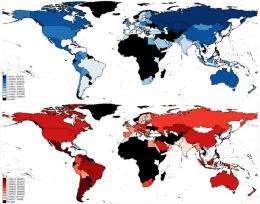If you're happy and you know it: Researchers trail Twitter to track world's mood swings

Using Twitter to monitor the attitudes of 2.4 million people in 84 countries, Cornell University researchers found that people all over the world awaken in a good mood – but globally that cheer soon deteriorates once the workday progresses.
By tracking Twitter tweets over two-years, researchers determined that work, sleep and the amount of daylight all play a role in shaping cyclical emotions such as enthusiasm, delight, alertness, distress, fear and anger.
Researchers have long known about these affective rhythms, but have relied on small homogeneous samples and have had no practical means for hourly and long-term observation of individual behavior in large and culturally diverse populations. Before the rise of social media, these kinds of results were inconclusive, according to the researchers Scott Golder, Cornell graduate student in sociology; and Michael Macy, Cornell professor of sociology. Their paper, "Diurnal and Seasonal Mood Tracks Work, Sleep and Daylength Across Diverse Cultures," was published in the journal Science, Sept. 29.
Using Twitter in conjunction with language monitoring software, Golder and Macy discovered two daily peaks in which tweets represented a positive attitude – relatively early in the morning and again near midnight, suggesting mood may be shaped by work-related stress. Positive tweets were also more abundant on Saturdays and Sundays, with the morning peaks occurring about two hours later in the day. This implies people awaken later on weekends.
These patterns were reflected in cultures and countries throughout the world, but shifted with the difference in time and work schedule. For example, positive tweets and late-morning mood peaks were more prominent on Fridays and Saturdays in the United Arab Emirates, where the traditional workweek is Sunday through Thursday, according to the paper.
Golder and Macy also tracked global attitude on a seasonal basis to determine if "winter blues" is represented in Twitter messages. While no correlation was discovered between absolute daylight and mood, there was a correlation when examining relative daylight, such as the gradually decreasing daylength between the summer and winter solstices.
More information: Paper online: www.sciencemag.org/lookup/doi/ … 1126/science.1206997
Provided by Cornell University




















